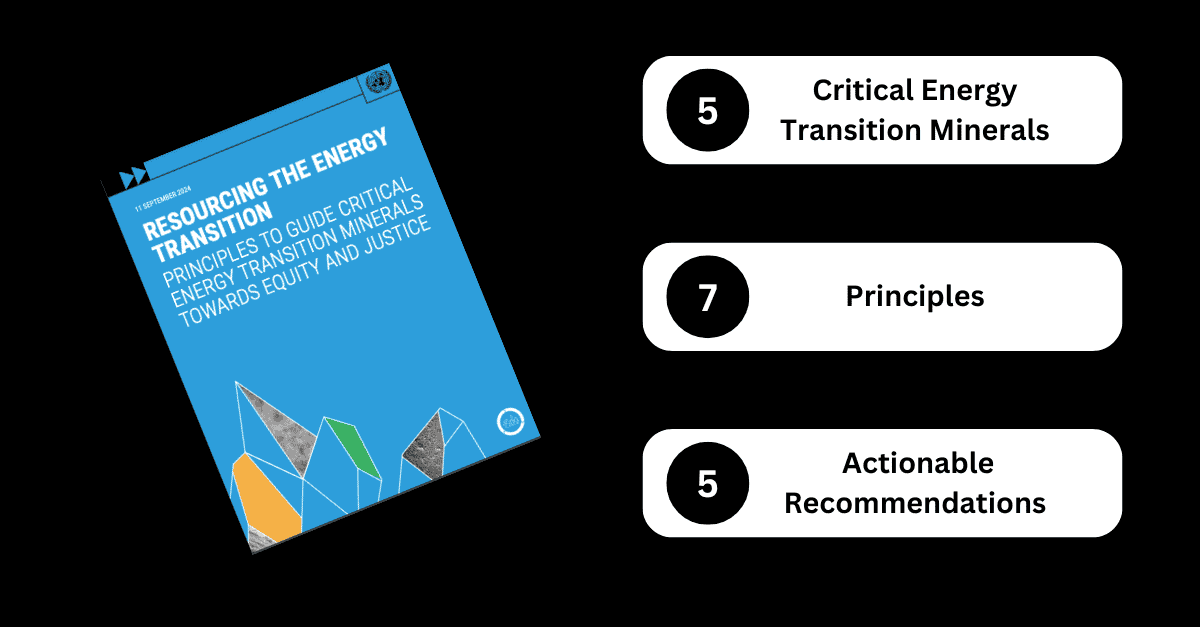Responding to the increasing demand for critical minerals required for a renewable energy future, the United Nations has released a report with recommendations and guidelines for governments, industry, and other stakeholders.
The climate crisis is impossible to deny, with more extreme weather events, rising sea levels, and increased biodiversity loss. At the 28th United Nations Climate Change Conference (COP28), governments agreed to triple renewable energy capacity and double energy efficiency by 2030 to address this global crisis. Significantly increasing the critical energy transition minerals supply is the only way to meet these goals. According to the International Energy Agency, critical mineral demand for clean energy applications is set to almost triple by 2030 and quadruple by 2040 to reach global net zero carbon dioxide emissions by 20501.
Limiting global warming to 1.5 degrees Celsius to avoid the worst climate change impacts will require enough critical minerals—copper, lithium, nickel, cobalt, manganese, and rare earth elements—which are essential for clean energy technologies such as electric vehicles, solar panels, wind turbines, and battery energy storage.
The UN Panel’s Recommendations
The UN Secretary General’s Panel on Critical Energy Transition Minerals, a diverse expert panel, has developed principles and actionable recommendations to guide the global energy transition to advance fairness and justice across critical mineral value chains on the way to net-zero emissions.
“Today’s report from the Panel on Critical Energy Transition Minerals is a how-to guide to help generate prosperity and equality alongside clean power. The report recommends critical minerals at a crucial time,” UN Secretary-General António Guterres said. “This report identifies ways to ground the renewables revolution in justice and equity, so that it spurs sustainable development, respects people, protects the environment, and powers prosperity in resource-rich developing countries,” the Secretary-General said, adding that, “as next steps, I have asked the Co-Chairs and Panel to consult and share the report and its recommendations with Member States and other stakeholders ahead of COP29 later this year.” 2
The principles build on existing international norms and legal obligations to which governments have already committed and include specific, actionable recommendations for everyone to benefit from the opportunities intrinsic in a renewable energy transition.
The seven principles3 are:
- Principle 1: Human rights must be at the core of all mineral value chains.
- Principle 2: The integrity of the planet, its environment, and biodiversity must be safeguarded.
- Principle 3: Justice and equity must underpin mineral value chains.
- Principle 4: Development must be fostered through benefit sharing, value addition, and economic diversification.
- Principle 5: Investments, finance, and trade must be responsible and fair.
- Principle 6: Transparency, accountability, and anti-corruption measures are necessary to ensure good governance.
- Principle 7: Multilateral and international cooperation must underpin global action and promote peace and security. Key Actionable Recommendations
The panel also identified specific actions governments, industry, and other stakeholders can take to implement these principles. These actionable recommendations4 are:
- Actionable Recommendation 1: Accelerate greater benefit sharing, value addition, and economic diversification.
- Actionable Recommendation 2: Develop traceability for accountability.
- Actionable Recommendation 3 Establish a global mining legacy fund.
- Actionable Recommendation 4: Empower artisanal and small-scale miners toward responsibility.
- Actionable Recommendation 5: Implement material efficiency and circularity targets to balance consumption and reduce environmental impacts.
Conclusion
The UN panel’s recommendations provide a roadmap for a sustainable energy transition. By following these principles and taking concrete actions, we can ensure that the transition to renewable energy benefits everyone.
- IEA report on critical minerals: Clean energy transitions are driving a significant increase in mineral demand
- Press release: UN-convened panel releases recommendations for governments and industry to guide the global energy transition
- UN Report: Resourcing the Energy Transition Principles to Guide Critical Energy Transition Minerals Towards Equity and Justice
